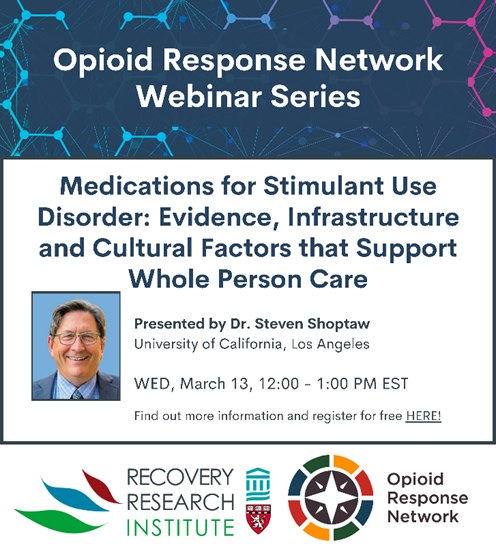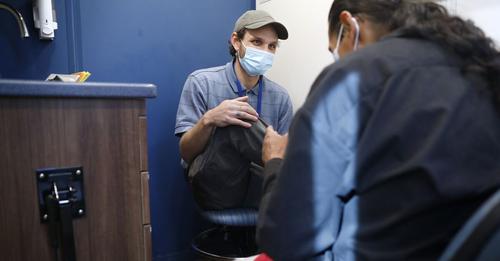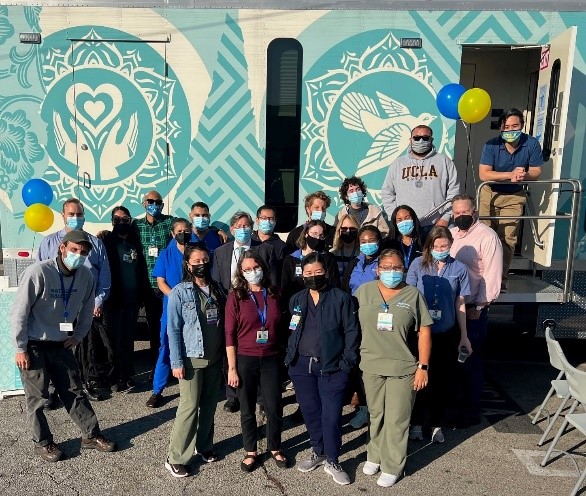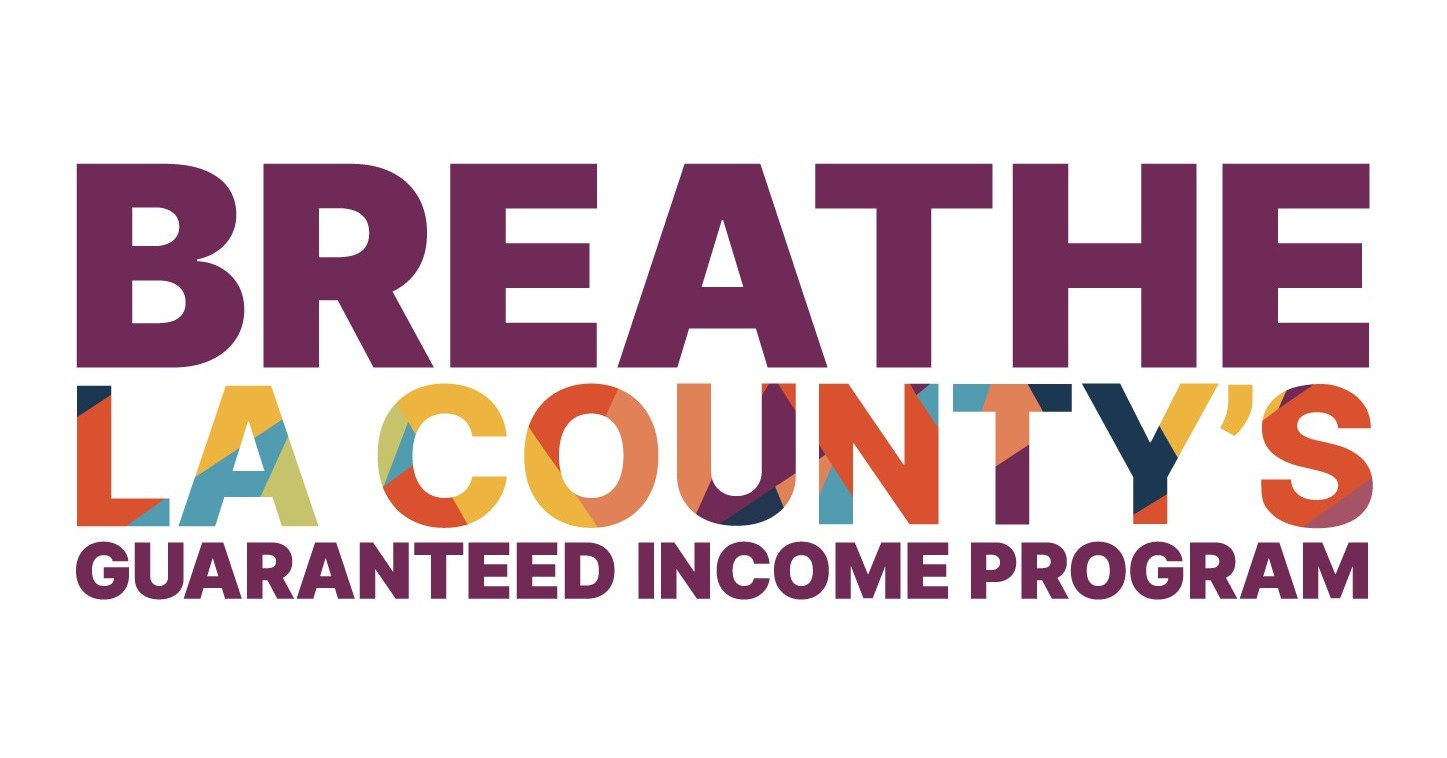Dr. Shoptaw recently presented at the Recovery Science Series event, hosted by the Recovery Research Institute and sponsored by the Opioid Response Network (ORN). His talk, titled “Medications for Stimulant Use Disorder: Evidence, Infrastructure, and Cultural Factors that Support Whole Person Care,” aimed to educate clinicians on treatments for stimulant use disorder. If you missed the live webinar, don’t worry! You can watch the recording on YouTube. Additionally, presentation slides are available here. ... Read More
If you haven’t had the chance to catch it, be sure to listen to Dr. Shoptaw featured in the Opioid Response Network Stimulants Workgroup Soundbites on Substance Use Disorders: Season 1: Stigma, Stimulants, and the Fight for Treatment Equity podcast series. The episodes offer insightful peer-to-peer discussions covering a variety of topics, including medications for treating stimulant use disorder, addressing stigma in healthcare policy and courts related to stimulants, family considerations, and issues concerning naloxone…... Read More
Dr. Steven Shoptaw highlights the underutilization of evidence-based addiction treatments in a recent New York Times article. He emphasizes the wealth of research supporting positive reinforcement strategies and contingency management, citing their effectiveness in helping individuals reduce substance use. Dr. Shoptaw criticizes the reluctance of addiction treatment programs to adopt proven methodologies, stating, “There’s all these studies showing that it works, but instead of trying something that’s got actual evidence behind it, they’re pouring all…... Read More
CBAM’s Dr. Allison Rosen published findings from the mSTUDY cohort showing that substance abuse treatment of any kind helped to reduce methamphetamine usage in the study population. Click here to read the press release.... Read More
CBAM’s Chris Blades sat down with UCLA Health news to talk about our work bringing research to underserved communities and what it takes to build the kind of trust necessary to be successful and to make an impact. A link to the full article can be found here.... Read More
On June 1, UCLA CBAM co-sponsored an event with the USC Institute for Addiction Science which included the screening of a short film documenting the impact of COVID-19 on people who take methadone. The film was followed by a panel discussion with addiction science experts Steve Shoptaw (UCLA CBAM) and Ricky Bluthenthal (USC), drug policy advocates, the filmmakers, and someone with lived experience with methadone. Methadone is a life-saving medication used to treat opioid use…... Read More
Cigarette smoking is the leading cause of preventable death in the US and it disproportionally affects individuals with mental and substance use disorders. Methamphetamine (MA) use in particular, is accompanied by high rates of comorbid tobacco smoking. Previous research has shown that the combination of naltrexone and oral bupropion (NTX-BUP) improves smoking cessation outcomes in non-MA-using populations. The ADAPT-2 trial, a NIDA Clinical Trials Network study in which CBAM participated, proved that NTX-BUP successfully reduced…... Read More
A Los Angeles Times investigative piece found that pharmacies across various northwestern cities in Mexico are selling counterfeit, drug-laced prescription pills and selling them as legitimate pharmaceuticals. Oxycodone pills & Adderall pills for example, both tested positive for fentanyl & methamphetamine respectively. UCLA researchers & CBAM collaborators, Drs. Chelsea Shover & David Goodman-Meza were quoted in the article as their research uncovered similar results. Dr. Shover stressed that the presence of counterfeit products containing fentanyl…... Read More
CBAM started off 2023 on the front page of the LA Times! Our mobile unit was featured in an article about barriers to Hep C treatment. We are so proud of the work our staff is doing every day to improve the lives of fellow Angelenos. You can read the full article here.... Read More
The pandemic brought a rise in substance use with use of methamphetamine (MA) most commonly linked to overdoses. CBAM researchers and other UCLA colleagues assessed the relationship between the use of MA and preventive behaviors for COVID-19. Not surprisingly, they found that those who report using MA were significantly less likely to take measures to protect themselves from COVID, demonstrating how chronic use can be utilized as a marker for other health risk behaviors. Understanding…... Read More
CBAM would like to thank everyone who attended our Open House event on Friday, December 9. We welcomed research participants, community partners, and academic colleagues who toured the site and learned more about our current and upcoming studies. For those of you who were unable to attend, please visit our website to learn about current studies and to take a virtual tour.... Read More
Individuals experiencing homelessness are at higher risk for COVID-19 infection. Although immunization against COVID-19 is the most effective means of prevention, there are barriers that impact uptake, such as limited access to healthcare services and concerns about vaccine safety. Results of a recent study lead by Dr. Chelsea Shover, Assistant Professor at the UCLA David Geffen School of Medicine, were recently published in the Journal of Infectious Diseases. Dr. Shover found that it was both…... Read More
A recent UCLA study led by Dr. Jennifer Fulcher of the DGSOM Division of Infectious Diseases and in collaboration with UCLA CBAM researchers suggest certain gut bacteria could contribute to one’s risk for HIV infection. A link between chronic HIV and changes in gut bacteria is known, however, further research is needed to understand if and how these bacteria could affect HIV transition. In this study, microbiome gut samples of 27 men who have sex…... Read More
Sept. 22, 2022. Dr. Steven Shoptaw was recently interviewed by a healthcare reporter at Clinical Trials Arena in London. He was quoted in their article entitled, “Is pharma neglecting the unmet need of substance use disorder therapies?”, which explores possible reasons behind the lack of pharma sponsorship in clinical trials investigating new addiction treatments. The article points out that, while there are currently hundreds of active or planned clinical trials investigating treatments for substance use…... Read More
A report published in the Lancet Psychology found that high-potency Cannabis may increase the risk of psychosis and addiction. Researchers found individuals with first episodes of cannabis-related psychosis were more likely to have been using products with high levels of THC. Animal studies suggest higher doses of THC are more likely to cause addiction. This research likewise showed increased risk of addiction in those using high-potency products in comparison to low potency cannabis. Dr. Ziva…... Read More
According to recent data from the National Center for Health Statistics, more than 100,000 people died of drug related overdoses in 2021. Prescription pain pills followed by waves in heroin, fentanyl, and meth use have all contributed to the rising overdose epidemic. Challenges brought on by the Covid-19 pandemic including social isolation, depression, and limited access to treatment, have contributed to these numbers. Overdose deaths spiked to unseen levels during the beginning of the pandemic,…... Read More
A contingency management program is currently helping people in LA’s Skid Row community stop using methamphetamine. Contingency management incentivizes individuals, most commonly monetarily, for positive behavioral changes. CBAM’s Dr. Shoptaw was interviewed for the article and noted the importance of these interventions in going beyond just paying people to do what they should be doing, “This is an intervention that actually stimulates the brain to work in different ways so that their goals are met.”…... Read More
Researchers from CBAM and Charles Drew University of Medicine and Science collaborated on a recent report entitled, Equity and Access: A Roadmap to Improving Vaccination Equity in South Los Angeles. This report provides insights on how to reach communities of color and the underserved to educate, build trust, and disseminate vaccines in South Los Angeles given historical experiences with medical mistrust. The findings from this report are based on data collected from three key groups…... Read More
Authors of a recent article featured in The New England Journal of Medicine discuss the importance and demand for new harm reduction approaches and substance use disorder treatments given the rise of overdose deaths during the COVID-19 pandemic. Overdose-prevention centers provide a safe space for individuals to consume pre-obtained drugs in controlled settings and have been associated with significant reductions in opioid overdose. Section 856 of the Controlled Substances Act however, creates uncertainty and challenges…... Read More
From 2020-2021, a dramatic increase in the use of illicit fentanyl as well as methamphetamine and cocaine has dramatically contributed to overdose deaths exceeding 100,000. Dr. Bobby Mukkamala, chair of the American Medical Association (AMA), notes addressing current health inequities that might negatively affect minority populations and people of color is especially important as structurally marginalized populations are disproportionately affected by the drug overdose crisis. Current health equity research has addressed the struggles patients from…... Read More
CBAM’s own Dr. Jesse Clark was recently interviewed by NPR about his experience with both the COVID and HIV pandemics and how development of the COVID vaccines have accelerated the pace of development of an HIV vaccine. Click here for the interview feature in its entirety.... Read More
Methamphetamine use is a growing global concern that has hampered efforts to address opioid use disorder and HIV infection. Evidence-based behavioral interventions (EBIs) to reduce methamphetamine exist, but current research on optimal EBI combinations to reduce methamphetamine use is limited. In Vietnam, methamphetamine co-use is prevalent in people receiving methadone maintenance treatment (MMT) for opioid use disorder. In response to this co-epidemic, CBAM’s Drs. Michael Li and Steve Shoptaw are collaborating with Dr. Giang Le…... Read More
A NIDA funded analysis of data from the 2018 National Survey of Substance Abuse Treatment Services assessed availability of HIV testing and counseling services in U.S. substance use treatment facilities. Among these facilities, investigators found only three in ten offered HIV testing. Additionally, HIV testing was more likely to be offered in facilities that offered medication for opioid use disorder. Overall, in only three states was HIV testing offered by at least 50% of facilities.…... Read More
HIV diagnosis and prevalence among people who inject drugs has increased alarmingly in recent years. Syringe services programs (SSPs) are both economic and highly effective in reducing HIV transmission and critical to the success of the “Ending the HIV Epidemic” initiative. An in-depth literature review was conducted to assess how critical a role SSPs play in addressing this growing concern. This review concluded SSPs “have the highest impact in HIV prevention when combined with access…... Read More
The Carlat Psychiatry Podcast, a digital program that reviews evidence-based psychiatry, recently provided an overview of the history and pharmacology of methamphetamine use disorder. In this segment, the ADAPT-2 trial published in The New England Journal of Medicine (for which CBAM’s Vine St. Clinic served as a clinical research site and Dr. Shoptaw co-authored) was discussed. To hear the podcast and learn more about the basics of methamphetamine use disorder and the current novel treatment…... Read More
Los Angeles County is launching a guaranteed income project known as “Breathe” to help address financial uncertainty and provide eligible residents with needed monetary assistance. The program will provide 1,000 selected residents with $1,000 per month for three years. Applicants must meet all of the following requirements: Be 18 years of age or older Live in a Los Angeles County neighborhood that falls at or below 100% of the County’s Area Median Household Income (AMI)…... Read More
The LEAD program was developed to support early-career investigators from racial/ethnic minority groups that are traditionally underrepresented in the substance use disorder research field. This program is integrated within the National Institute on Drug Abuse (NIDA) Clinical Trials Network (CTN) and serves as a platform for training early career research scientists. Based at the University of California, San Francisco (UCSF), this 3-year training program utilizes a team mentoring approach. Visiting scholars spend three summers in…... Read More
CBAM’s mobile clinic team continues its conduct of the INTEGRA study bringing treatment for opioid use disorder, as well as HIV prevention and treatment, directly to those who need it. This past week, we were at the LA Grand Hotel. The Hotel is currently a Project Room Key site, a collaborative effort by the State, County and the Los Angeles Homeless Services Authority to secure hotel and motel rooms for vulnerable people experiencing homelessness. It…... Read More
Methamphetamine (MA) related overdose deaths have increased dramatically in the United States in the past several years. MA use is linked to a variety of adverse health related conditions and can complicate the management of chronic and infectious disease and severely impact one’s overall quality of life. There are currently no FDA approved medications for the treatment of Methamphetamine Use Disorder and there are a limited number of effective behavioral treatment options. Researchers at UCLA,…... Read More
The UCLA Vine Street Clinic served as one of the study sites for the HPTN 083 trial, a study that sought to compare the efficacy of cabotegravir (CAB LA) to daily oral tenofovir/emtricitabine (TDF/FTC) for HIV prevention. Data obtained from this and other studies helped inform the U.S. Food and Drug Administration (FDA)’s approval of long-acting cabotegravir (CAB-LA) injections for the prevention of HIV. “Results of this NIAD/NIH sponsored and co-funded study showed that CAB-LA…... Read More
“A study of HIV-positive black and Latino men who have sex with men finds the use of methamphetamine combined with intimate partner violence boosted the activity of genes that regulate the body’s inflammatory and antiviral functions.” Researchers of this study-including CBAM’s own Drs. Michael Li, Mariah Kalmin & Steven Shoptaw, sought to further understand the link between stress biology and substance use disorders as these findings demonstrate that both social challenges and substance use play…... Read More
The University of New South Wales Sydney (UNSW) & National Drug and Alcohol Research Centre (NDARC) recently invited Dr. Steven Shoptaw to lecture at a collaborative seminar titled, ASCEND: Therapeutic Interventions for Methamphetamine Dependence. Methamphetamine dependence is a growing public health concern in Australia and many parts of the world. There are currently no approved pharmacotherapies for its treatment, but researchers have been evaluating potentially effective medications as possible treatment options. The ASCEND program (Advancing…... Read More
Dr. Shoptaw was given the honor to present a talk, ‘Medications as Foundation for Stimulant Use Disorder Treatment: Is it Time?’, at this year’s annual Eric D. Hadar Distinguished Lecture at the Columbia University Department of Psychiatry. Since its inception in 2016, the Eric D. Hadar Distinguished Lecture series has broadened the discussion and understanding of current research findings related to substance use disorders and their available treatment options. Columbia’s Division of Substance Use Disorders…... Read More
Q2i is a digital health company that develops technology designed to improve treatment for Substance Use Disorder (SUD). OARS technology is utilized by Medication-Assisted Treatment (MAT) program providers, an approach that combines medication (i.e. methadone and buprenorphine) with counseling and behavioral therapies to reduce and treat Opioid Use Disorder (OUD). The application developed by Q2i features a healthcare team portal along with a patient mobile application that allows providers to examine real time reporting and…... Read More
As you may have read in our annual report, CBAM is preparing to go mobile! We are procuring a mobile clinic equipped with two rooms that will allow us to bring addiction treatment and HIV prevention directly to those most in danger of opioid overdose. This new research project is led by our own Dr. Shoptaw and coordinated through the HIV Prevention Trials Network with collaborating sites in Houston, Pittsburgh, Washington DC, and the Bronx.…... Read More
Dr. Madhukar Trivedi recently presented the paper featured on The New England Journal of Medicine titled “Naltrexone plus Bupropion in Methamphetamine Use Disorder” during the Biweekly CTN Big South/West Node Journal Club. The Journal Club promotes an educational environment where colleagues can discuss and evaluate academic literature and identify new research methods or findings in their respective fields. To view the 1/27/21 Journal Club session click here.... Read More
Dr. Shoptaw recently co-authored a paper in The New England Journal of Medicine, titled “Naltrexone plus Bupropion in Methamphetamine Use Disorder.” Currently, there is no medication approved by the Food and Drug Administration (FDA) for the treatment of methamphetamine use disorder. In the paper, Dr. Shoptaw and co-authors discuss a clinical trial that examined two drugs-Naltrexone and Bupropion-used in combination to help those with methamphetamine use disorder avoid relapse. Bupropion is a stimulant like anti-depressant…... Read More
2021 NIDA Summer Research Internship Program Call for Applications- Application Deadline: February 12, 2021. Substance abuse and addiction research internship opportunity: The NIDA Summer Research Internship Program introduces undergraduate students, with a goal of increasing underrepresented groups in biomedical and behavioral sciences, to substance abuse and addiction research. Through this program, undergraduate students age 18 years and older, conduct substance abuse and addiction research by participating in internships with NIDA funded scientists at universities across…... Read More
Interim Analysis Shows High Efficacy Rate for the mRNA-1273 Vaccine It was announced today that the Moderna COVID-19 vaccine trial “has met the statistical criteria pre-specified in the study protocol for efficacy, with a vaccine efficacy of 94.5%.” This is based on the first interim analysis of the data, conducted by an independent, NIH-appointed Data Safety Monitoring Board. Of the 30,000 participants enrolled in the trail, one half received the vaccine and one half received…... Read More
The UCLA Vine Street Clinic has begun enrollment in the Moderna trial. This is one of several studies seeking a vaccine for SARS-CoV-2, also known as COVID-19. The purpose of this study is to test Moderna’s vaccine candidate (mRNA-1273) to see if it can prevent illness in people who are exposed to the SARS-CoV-2 virus in their everyday lives. This vaccine is not made from the SARS-CoV-2 virus. It is made from messenger ribonucleic acid…... Read More


























